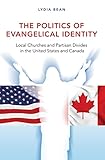The Politics of Evangelical Identity : Local Churches and Partisan Divides in the United States and Canada / Lydia Bean.
Material type: TextPublisher: Princeton, NJ : Princeton University Press, [2014]Copyright date: ©2014Edition: Pilot project. eBook available to selected US libraries onlyDescription: 1 online resource (336 p.) : 2 tables. 1 mapContent type:
TextPublisher: Princeton, NJ : Princeton University Press, [2014]Copyright date: ©2014Edition: Pilot project. eBook available to selected US libraries onlyDescription: 1 online resource (336 p.) : 2 tables. 1 mapContent type: - 9780691161303
- 9781400852611
- Evangelicalism -- Canada
- Evangelicalism -- United States
- SOCIAL SCIENCE / Sociology of Religion
- American churches
- American congregations
- American evangelicals
- American religion
- Baptist churches
- Canadian churches
- Canadian evangelicals
- Catholic Bishops
- Catholics
- Charles McVety
- Christian Right
- Christian activists
- Christian nationalism
- Christian radio
- Democrats
- Evangelical Christians
- Fox News
- Grace Assembly of God
- Highpoint Baptist
- Lifeway Assembly of God
- Northtown Baptist
- Pentecostal churches
- Pentecostals
- Protestants
- Republican Party
- Republicans
- U.S. churches
- advocacy groups
- alternative leaders
- born-again Christians
- charismatics
- coalition
- conservative Protestants
- conservative politics
- creation care
- economic conservatism
- ethnoreligious communities
- evangelical Christianity
- evangelical Christians
- evangelical agenda
- evangelical identity
- evangelicals
- fundamentalists
- good Christians
- individualistic theology
- local pastors
- moral conformity
- moral issues
- national identity
- nominal Christians
- opinion leaders
- partisanship
- pastors
- political conservatism
- political diversity
- political elites
- political influence
- political talk
- poverty
- racial reconciliation
- religious identity
- religious nationalism
- subcultural identity
- television pundits
- theology
- white evangelical Christians
- 322.10973 23
- BR1642.U5 B43 2017
- online - DeGruyter
- Issued also in print.
| Item type | Current library | Call number | URL | Status | Notes | Barcode | |
|---|---|---|---|---|---|---|---|
 eBook
eBook
|
Biblioteca "Angelicum" Pont. Univ. S.Tommaso d'Aquino Nuvola online | online - DeGruyter (Browse shelf(Opens below)) | Online access | Not for loan (Accesso limitato) | Accesso per gli utenti autorizzati / Access for authorized users | (dgr)9781400852611 |
Frontmatter -- Contents -- Timeline -- Preface and Acknowledgments -- Introduction -- Chapter 1. Comparing Evangelicals in the United States and Canada -- Chapter 2. The Boundaries of Evangelical Identity -- Chapter 3. Two American Churches: Partisanship without Politics -- Chapter 4. Two Canadian Churches: Civil Religion in Exile -- Chapter 5. Evangelicals, Economic Conservatism, and National Identity -- Chapter 6. Captains in the Culture War -- Chapter 7. The Boundaries of Political Diversity in Two U.S. Congregations -- Chapter 8. Practicing Civility in Two Canadian Congregations -- Conclusion. Politics and Lived Religion -- Methodological Appendix: Ethnographic Methods -- Notes -- Bibliography -- Index
restricted access online access with authorization star
http://purl.org/coar/access_right/c_16ec
It is now a common refrain among liberals that Christian Right pastors and television pundits have hijacked evangelical Christianity for partisan gain. The Politics of Evangelical Identity challenges this notion, arguing that the hijacking metaphor paints a fundamentally distorted picture of how evangelical churches have become politicized. The book reveals how the powerful coalition between evangelicals and the Republican Party is not merely a creation of political elites who have framed conservative issues in religious language, but is anchored in the lives of local congregations.Drawing on her groundbreaking research at evangelical churches near the U.S. border with Canada-two in Buffalo, New York, and two in Hamilton, Ontario-Lydia Bean compares how American and Canadian evangelicals talk about politics in congregational settings. While Canadian evangelicals share the same theology and conservative moral attitudes as their American counterparts, their politics are quite different. On the U.S. side of the border, political conservatism is woven into the very fabric of everyday religious practice. Bean shows how subtle partisan cues emerge in small group interactions as members define how "we Christians" should relate to others in the broader civic arena, while liberals are cast in the role of adversaries. She explains how the most explicit partisan cues come not from clergy but rather from lay opinion leaders who help their less politically engaged peers to link evangelical identity to conservative politics.The Politics of Evangelical Identity demonstrates how deep the ties remain between political conservatism and evangelical Christianity in America.
Issued also in print.
Mode of access: Internet via World Wide Web.
In English.
Description based on online resource; title from PDF title page (publisher's Web site, viewed 30. Aug 2021)


